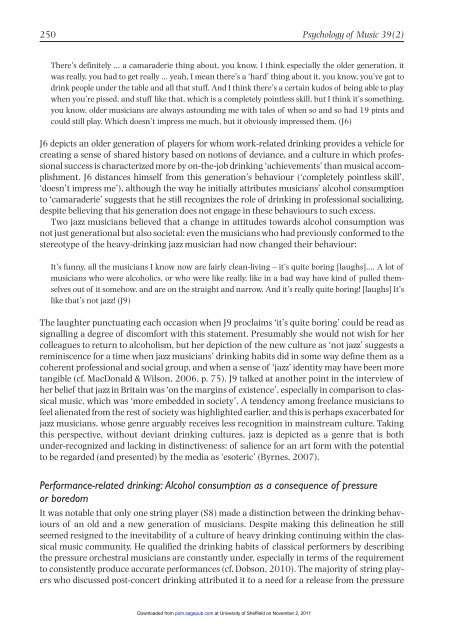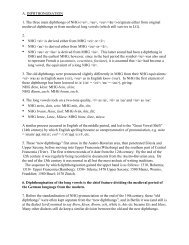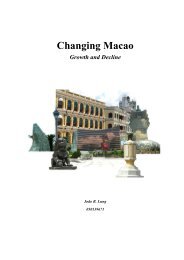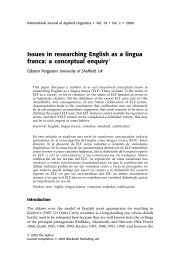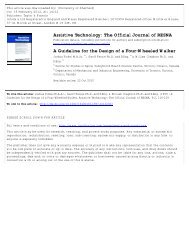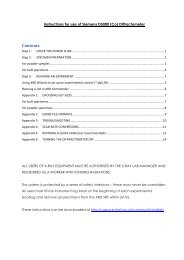Dobson, 2010.pdf - University of Sheffield
Dobson, 2010.pdf - University of Sheffield
Dobson, 2010.pdf - University of Sheffield
You also want an ePaper? Increase the reach of your titles
YUMPU automatically turns print PDFs into web optimized ePapers that Google loves.
250 Psychology <strong>of</strong> Music 39(2)<br />
There’s definitely … a camaraderie thing about, you know, I think especially the older generation, it<br />
was really, you had to get really … yeah, I mean there’s a ‘hard’ thing about it, you know, you’ve got to<br />
drink people under the table and all that stuff. And I think there’s a certain kudos <strong>of</strong> being able to play<br />
when you’re pissed, and stuff like that, which is a completely pointless skill, but I think it’s something,<br />
you know, older musicians are always astounding me with tales <strong>of</strong> when so and so had 19 pints and<br />
could still play. Which doesn’t impress me much, but it obviously impressed them. (J6)<br />
J6 depicts an older generation <strong>of</strong> players for whom work-related drinking provides a vehicle for<br />
creating a sense <strong>of</strong> shared history based on notions <strong>of</strong> deviance, and a culture in which pr<strong>of</strong>essional<br />
success is characterized more by on-the-job drinking ‘achievements’ than musical accomplishment.<br />
J6 distances himself from this generation’s behaviour (‘completely pointless skill’,<br />
‘doesn’t impress me’), although the way he initially attributes musicians’ alcohol consumption<br />
to ‘camaraderie’ suggests that he still recognizes the role <strong>of</strong> drinking in pr<strong>of</strong>essional socializing,<br />
despite believing that his generation does not engage in these behaviours to such excess.<br />
Two jazz musicians believed that a change in attitudes towards alcohol consumption was<br />
not just generational but also societal: even the musicians who had previously conformed to the<br />
stereotype <strong>of</strong> the heavy-drinking jazz musician had now changed their behaviour:<br />
It’s funny, all the musicians I know now are fairly clean-living – it’s quite boring [laughs].... A lot <strong>of</strong><br />
musicians who were alcoholics, or who were like really, like in a bad way have kind <strong>of</strong> pulled themselves<br />
out <strong>of</strong> it somehow, and are on the straight and narrow. And it’s really quite boring! [laughs] It’s<br />
like that’s not jazz! (J9)<br />
The laughter punctuating each occasion when J9 proclaims ‘it’s quite boring’ could be read as<br />
signalling a degree <strong>of</strong> discomfort with this statement. Presumably she would not wish for her<br />
colleagues to return to alcoholism, but her depiction <strong>of</strong> the new culture as ‘not jazz’ suggests a<br />
reminiscence for a time when jazz musicians’ drinking habits did in some way define them as a<br />
coherent pr<strong>of</strong>essional and social group, and when a sense <strong>of</strong> ‘jazz’ identity may have been more<br />
tangible (cf. MacDonald & Wilson, 2006, p. 75). J9 talked at another point in the interview <strong>of</strong><br />
her belief that jazz in Britain was ‘on the margins <strong>of</strong> existence’, especially in comparison to classical<br />
music, which was ‘more embedded in society’. A tendency among freelance musicians to<br />
feel alienated from the rest <strong>of</strong> society was highlighted earlier, and this is perhaps exacerbated for<br />
jazz musicians, whose genre arguably receives less recognition in mainstream culture. Taking<br />
this perspective, without deviant drinking cultures, jazz is depicted as a genre that is both<br />
under-recognized and lacking in distinctiveness: <strong>of</strong> salience for an art form with the potential<br />
to be regarded (and presented) by the media as ‘esoteric’ (Byrnes, 2007).<br />
Performance-related drinking: Alcohol consumption as a consequence <strong>of</strong> pressure<br />
or boredom<br />
It was notable that only one string player (S8) made a distinction between the drinking behaviours<br />
<strong>of</strong> an old and a new generation <strong>of</strong> musicians. Despite making this delineation he still<br />
seemed resigned to the inevitability <strong>of</strong> a culture <strong>of</strong> heavy drinking continuing within the classical<br />
music community. He qualified the drinking habits <strong>of</strong> classical performers by describing<br />
the pressure orchestral musicians are constantly under, especially in terms <strong>of</strong> the requirement<br />
to consistently produce accurate performances (cf. <strong>Dobson</strong>, 2010). The majority <strong>of</strong> string players<br />
who discussed post-concert drinking attributed it to a need for a release from the pressure<br />
Downloaded from<br />
pom.sagepub.com at <strong>University</strong> <strong>of</strong> <strong>Sheffield</strong> on November 2, 2011


